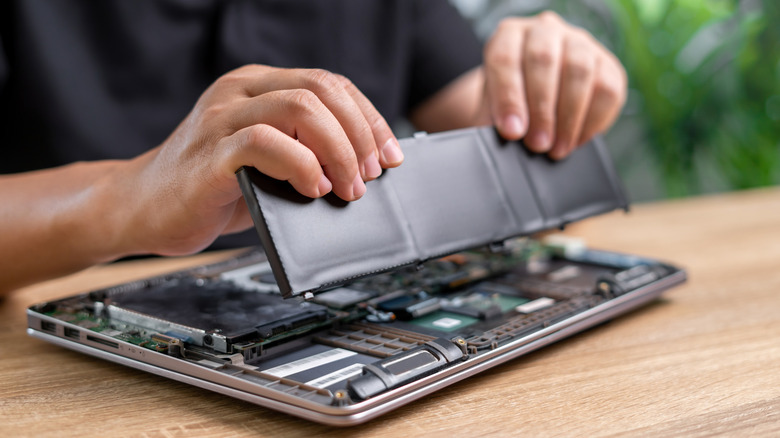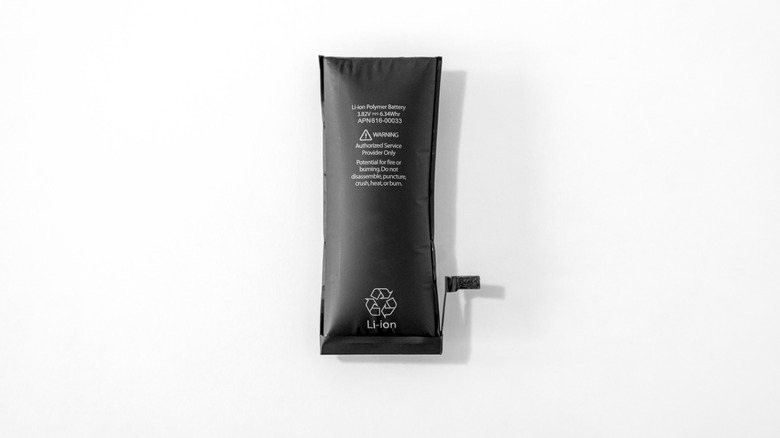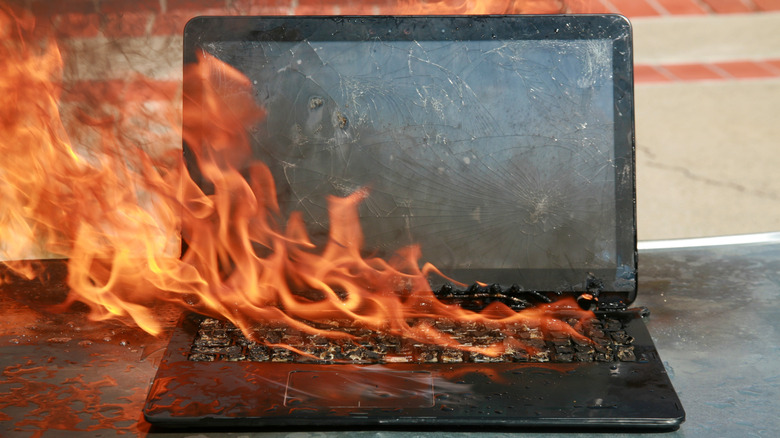What Causes A Swollen Battery In Your Laptop & Is It Safe To Still Use?
From smartphones to laptops to even styluses like the Apple Pencil, many devices rely on lithium-ion batteries. These batteries have become increasingly popular in recent years due to their slim design, enabling thinner and sleeker laptops that offer ultimate portability.
While these batteries are undeniably the reason why our devices can run the entire day with a single charge, they’re far from perfect and can be prone to swelling under certain conditions, such as overcharging, excessive heat, or age-related degradation. With lithium-ion batteries, the amount of charge they withhold diminishes as they chemically age. As these batteries age, the repeated charge and discharge cycles cause chemical reactions within the battery to become less efficient over time. This eventually leads to the buildup of gasses, such as oxygen and carbon dioxide, alongside other hazardous gasses potentially, which in turn causes the battery to swell.
So, can you still use a laptop with a swollen battery? The short answer is no, a laptop with a swollen battery isn’t typically safe to use and is a clear warning sign that your laptop needs to be repaired immediately. Let’s take a closer look at what causes a swollen battery, if there’s anything you can do to prevent it, and what it means for your device’s performance and safety.
What causes your laptop’s battery to swell or expand?
Ever heard people say not to charge your devices overnight? There’s a good reason for it: the most common cause of battery swelling is overcharging. When a laptop is left plugged in for extended periods, the battery continues to receive energy even after it’s fully charged. This excess current causes the battery’s chemicals to degrade over time. As a result, the lithium-ion batteries end up releasing all the toxic gasses that build up within the sealed battery casing, eventually leading to a swollen battery.
Other than overcharging, a swollen battery can also occur due to impact. Regardless of how durable you think your $1,000 laptop is, it’s just as susceptible to damage as any other device. An accidental knock or drop can end up puncturing the delicate layers within a lithium-ion battery, and expose the battery’s internal components to hot air. This can potentially trigger chemical reactions that release toxic gasses like methane, carbon monoxide, and hydrogen, and lead to a swollen battery.
External environments, like leaving your laptop in a parked car when the weather’s exceptionally hot during the summers, can also cause your laptop’s internal components to heat up. This could ultimately lead to your battery swelling up. Your laptop’s battery swelling might not necessarily have anything to do with you. At times, your battery may also undergo pre-mature swelling due to faulty construction, poor-quality materials, or errors during the manufacturing process.
If your laptop’s battery is swollen, is it still safe to use?
After spending thousands on a laptop, everyone wants to maximize their device’s life and dread the thought of having to spend hundreds (if not thousands) on repairs or replacements. Unfortunately, while laptops nowadays are more durable than ever, they’re not immune to issues. While software issues can often be fixed with a quick Google search, hardware issues like swollen batteries are much more complex. There’s little to no space for experimentation or taking risks when it comes to the health and safety of your device. If you’ve noticed your laptop changing shape, its screen not closing completely, a visible gap between the upper and lower parts of the case, or failing to sit perfectly flat, we have some bad news for you: there’s a good chance your device’s battery may be swelling.
Swollen batteries not only ruin your device’s physical appearance but also pose significant safety hazards, including the risk of leaks, overheating, or even fire. Many users on forums like Reddit have shared stories of laptops emitting fumes and eventually catching fire due to swollen batteries. For example, in one Reddit post, a laptop began releasing smoke and eventually burst into flames. The users immediately attempted to pick up the burning device and take it outside. While this was a risky move given the dangers involved, it goes to how just how dangerous a swollen battery can be. So, if your device shows any signs of battery swelling, it’s a good idea to seek professional help immediately, instead of continuing to use your device or attempting a self-repair.
Source: http://www.slashgear.com/1736997/is-swollen-battery-laptop-still-safe-use-what-causes-issue/
 techandtab
techandtab



